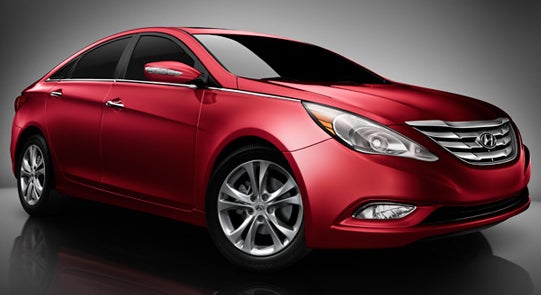
2012 Sonata:
 While the similarities between the Fusion and the Sonata are not nearly as great as those between the Escape and the CR-V, it is clear that Ford is keeping a close eye on its competitors – and is now willing to copy them. This is a new path for Ford, one that may backfire with the 2013 Escape, which received mixed results upon its unveiling. (The Benzinga crew – which includes three drivers of older Escape models – was particularly disappointed by Ford's redesign.)
However, it may prove to be an effective move for the Fusion, which seems to be getting nothing but praise from auto journalists and consumers alike. While I see it as a combination of the Sonata and one of Ford's own cars (the Focus), one of my colleagues thinks that the new Fusion is “like an Aston Martin mixed with a Jag.” That isn't a bad assessment, and may be exactly the kind of comparison that Ford was hoping to receive. But there's no denying that in this generation of less-boxy vehicles, Hyundai was one of the frontrunners – and, perhaps, the key inspiration for Ford's latest redesign.
This is very much a throwback to the auto trends of the ‘90s. Back then, Japanese automakers led the pack with the sleekest and curviest vehicles. While American automakers were still getting over the boxy trends of the ‘70s and ‘80s, Japanese carmakers were rounding out their edges. It wasn't until the ‘90s ended that the boxier look became cool again. And guess who spawned that trend? American car companies.
But while Ford was a leader of trucks with the overhauled F-150 and a leader of muscle cars with the redesigned Mustang, the classic automaker is beginning to follow in the footsteps of its competitors. Every car company is guilty of doing this at one time or another. But by being a follower, Ford not only runs the risk of being labeled a copier, it also faces the dilemma of shared loss when the latest “trend” proves to be less successful than anticipated.
While the similarities between the Fusion and the Sonata are not nearly as great as those between the Escape and the CR-V, it is clear that Ford is keeping a close eye on its competitors – and is now willing to copy them. This is a new path for Ford, one that may backfire with the 2013 Escape, which received mixed results upon its unveiling. (The Benzinga crew – which includes three drivers of older Escape models – was particularly disappointed by Ford's redesign.)
However, it may prove to be an effective move for the Fusion, which seems to be getting nothing but praise from auto journalists and consumers alike. While I see it as a combination of the Sonata and one of Ford's own cars (the Focus), one of my colleagues thinks that the new Fusion is “like an Aston Martin mixed with a Jag.” That isn't a bad assessment, and may be exactly the kind of comparison that Ford was hoping to receive. But there's no denying that in this generation of less-boxy vehicles, Hyundai was one of the frontrunners – and, perhaps, the key inspiration for Ford's latest redesign.
This is very much a throwback to the auto trends of the ‘90s. Back then, Japanese automakers led the pack with the sleekest and curviest vehicles. While American automakers were still getting over the boxy trends of the ‘70s and ‘80s, Japanese carmakers were rounding out their edges. It wasn't until the ‘90s ended that the boxier look became cool again. And guess who spawned that trend? American car companies.
But while Ford was a leader of trucks with the overhauled F-150 and a leader of muscle cars with the redesigned Mustang, the classic automaker is beginning to follow in the footsteps of its competitors. Every car company is guilty of doing this at one time or another. But by being a follower, Ford not only runs the risk of being labeled a copier, it also faces the dilemma of shared loss when the latest “trend” proves to be less successful than anticipated.
Bullish:
Traders who think Ford will thrive regardless of who it copies may want to:
- Go long Ford.
- Go long Toyota TM, a thriving company that has been copying the designs of other automakers for decades.
Traders who are worried about Ford's future may want to:
- Consider Honda, the company that inspired Ford to become a copycat.
© 2024 Benzinga.com. Benzinga does not provide investment advice. All rights reserved.
Comments
Trade confidently with insights and alerts from analyst ratings, free reports and breaking news that affects the stocks you care about.